Veteran coach Kirk Heidelberg reflects on ELF, the growth of football, coaching with Nick Saban and the future
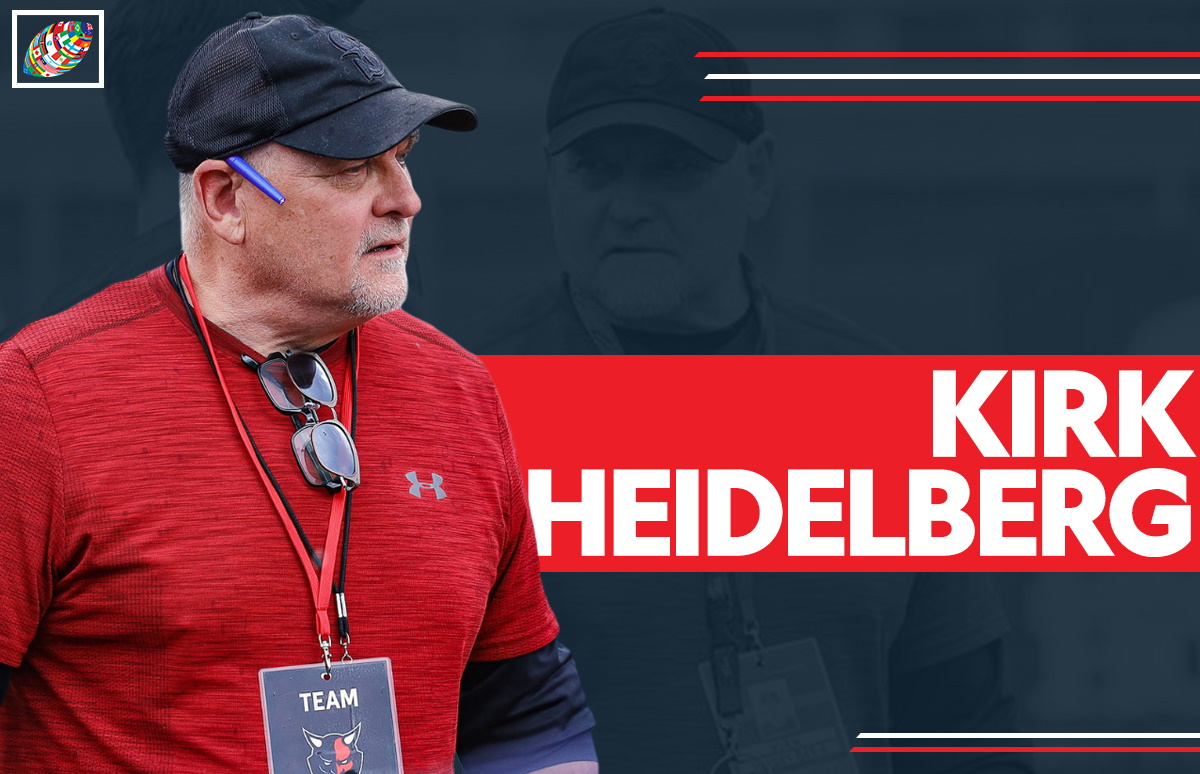
Not many coaches have a resume to match the diversity and caliber of Kirk Heidelberg’s. He has had a career as a football coach in Europe and North America to remember and has left an indelible stamp on the game he loves.
AFI recently caught up with Heidelberg and chatted with him about his coaching career and his thoughts on the European League of Football (ELF) as it has developed over the last two years.
Heidelberg began his European coaching career back in 1998 with the Hamburg Blue Devils, who he eventually took to the German Bowl in 2003. Before this though, Heidelberg had already accumulated an impressive coaching resume in the US serving as an assistant coach at the University of Toledo (with Nick Saban), Tennessee State University, Lehigh University, and the University of Kansas.
He has since spent many years coaching in Europe, most notably in the German Football League, with teams such as the Cologne Crocodiles, Hamburg Huskies, Saarland Hurricanes and Dusseldorf Panthers. He also has spent time in Sweden with the Carlstad Crusaders and in the Canadian Football League with the Toronto Argonauts.
So, when the ELF launched in 2021, Heidelberg was one of the obvious choices to be named head coach of the Cologne Centurions. But after a 5-5 season with an upstart team, he decided to return to where it all started, in Hamburg with the Sea Devils. This past June, Heidelberg stepped away from the team due to health issues but is again ready for action.
AFI: When you first learned about the ELF, what about the league drew you to become a coach in its first season?’
Heidelberg: I was aware that Patrick Esume (ELF Commissioner) started the league; he actually played for me with the Hamburg Blue Devils back in the 90s. So, I was just keeping close contact, to find out any opportunities and I live in the Cologne area, and the opportunity was the head coach for Cologne. I did that last year, we went to the playoffs, we had Madre London who rushed for 2100 yards, had the number one offense, and I’m very proud of the players and all the hard work we put in.
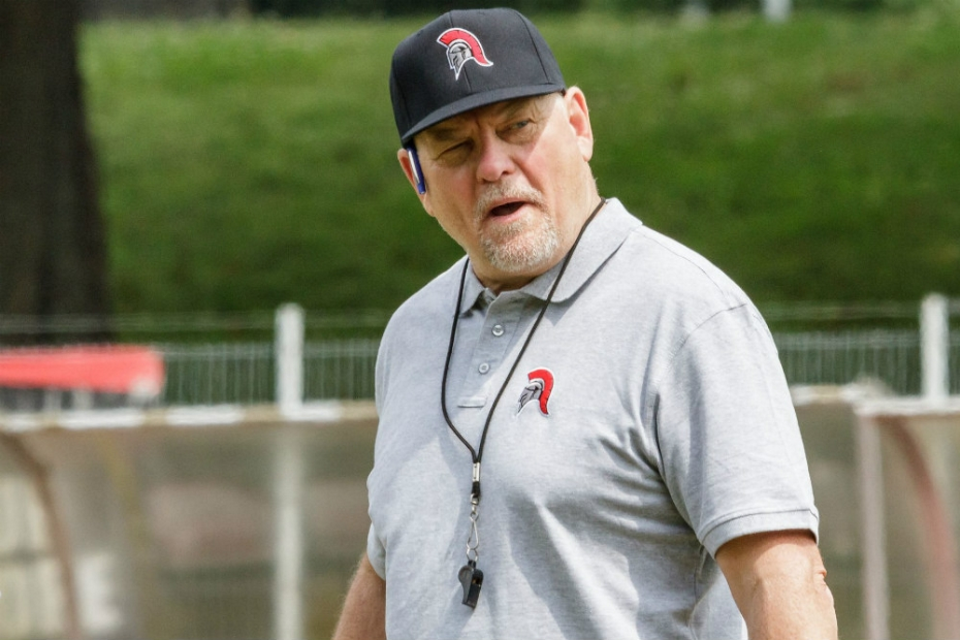
Photo: Touchdown24.de
AFI: What were your expectations as to how the league would do in its first year, especially given the uncertain times related to Covid-19?
Heidelberg: Well, I tell you, I was shocked at how well everything went. You gotta give credit to Patrick Esume, you got to give credit to all the general managers and the players, because it was amazing that we pulled it off. And they had some pretty stringent restrictions with Covid, and we had a test every practice and, you know, we made it, and I think after the Covid-19 shut down, our guys and all the guys were excited about playing football again.
AFI: Having coached for many years all over Europe, how would you say this league compares to leagues in which you’ve coached in the past?’
Heidelberg: Well, I coached mostly GFL in Germany, and I coached a little bit in Sweden. I think it’s top notch; we’ve got an excellent TV deal, there’s exposure for our players. Obviously, the GFL is a very good League. A lot of the GFL players have gone to the ELF. So I just think the league [ELF] is getting better. Obviously, Swarco and Vienna are top, solid teams. As you can see, they’ve got a lot of stability, and they have continuity, they’re not getting new coaches every year. So that’s the bonus for the league when you get some teams that are already developed. And they’re not really piecemealing everything together; they’re pretty solid. That’s what I think the league is striving for, is to get teams that are going to be around, and that’s important.
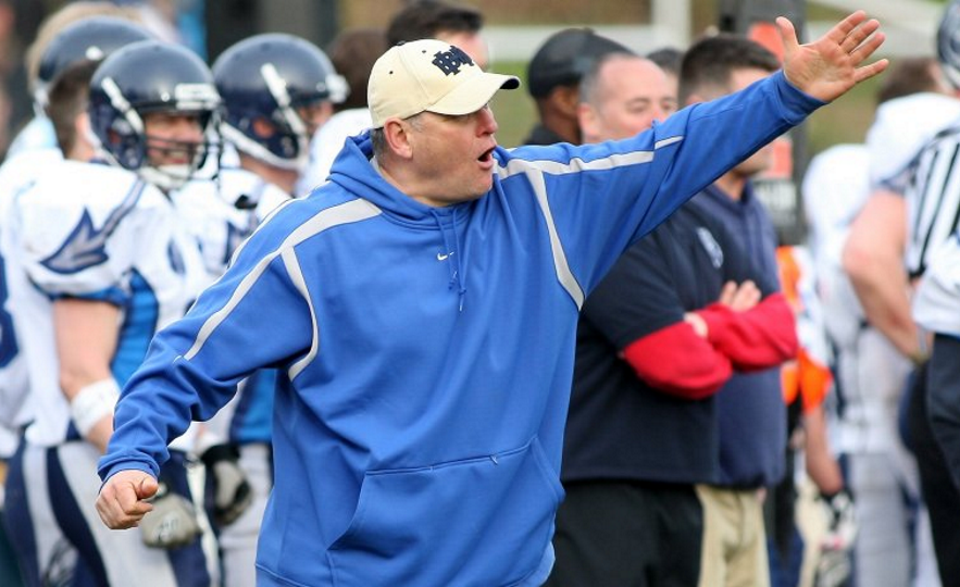
Kirk Heidelberg coaching Hamburg Blue Devils during reunion game
AFI: Were there any significant changes you noticed in the league’s second year compared to its first?’
Heidelberg: Yeah, definitely. I think the teams are getting better, there’s no question about it. I mean, you look at Barcelona (Dragons), they really improved. Obviously, Hamburg has a great defense but all the teams that from last year seemed to all improve. Berlin’s a nice surprise also. For me, what’s really important is player development. I’m more into player development. I work with guys in the offseason, I want to get guys better. There are two things that I really think are important for the league to continue and have a lot of stability. Number one, you develop players in the offseason, and number two, you develop coaches, because it’s a coach-run league. You can get 50 new teams and cities, but you need coaches and you need players and you need to develop them. And that’s where my experience of coaching in college comes in. I worked for Nick Saban at Toledo, it was his first head coaching job, and another guy named Gary Pinkel, and they’re like organizational freaks. Having an offseason program is so important, and I think that’s what’s really kind of missing with some teams, is they’re just waiting until May 1 to get started. But weight training, speed development and technique development is so important.
AFI: When I have watched videos of ELF games, I can see how passionate and invested the players are in their teams. Can you describe the general attitudes of the players you have coached in the ELF, especially on game days?
Heidelberg: It’s excellent, you know. Guys are excited. Obviously, if you’re gonna be on TV and there’s a lot of exposure, you want your players to compete and be competitive. And they’re doing that. It’s about building your roster also. You’ve got to build your roster and develop players. It’s great to have excitement, and that’s going to come with winning also. It’s first class, they get to travel well, they get to see different places and get out of Germany. So I think that’s an excellent opportunity for players.
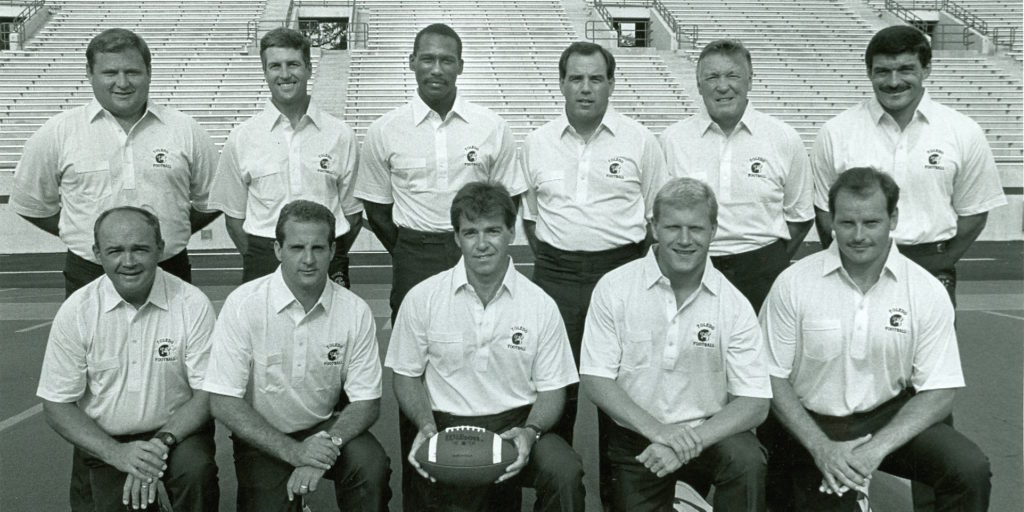
University of Toledo coaching staff in 1990 with Nick Saban center, first row and Kirk Heidelberg far right, first row
AFI: Can you talk about your thoughts on the fans over there of the ELF and of American football in general, and how active and knowledgeable they’ve been?
Heidelberg: To me personally, because I’m in Hamburg, I’m biased but I really love the Hamburg fans, because they get 5,000 a game. They’re very passionate. They stay to the end. Even last year in Cologne, when we went .500, when it was a Covid season. Frankfurt has great fans and so do a lot of the other teams, like Barcelona, and they’re passionate, and I think it’s only gonna get better as football grows. And obviously, Rhein Fire is drawing the best right now. So, you know, I think they have close to 8,000 fans (per game). Once the teams really start taking off, the league is expanding, so it’s going to get more fun with rivalries.
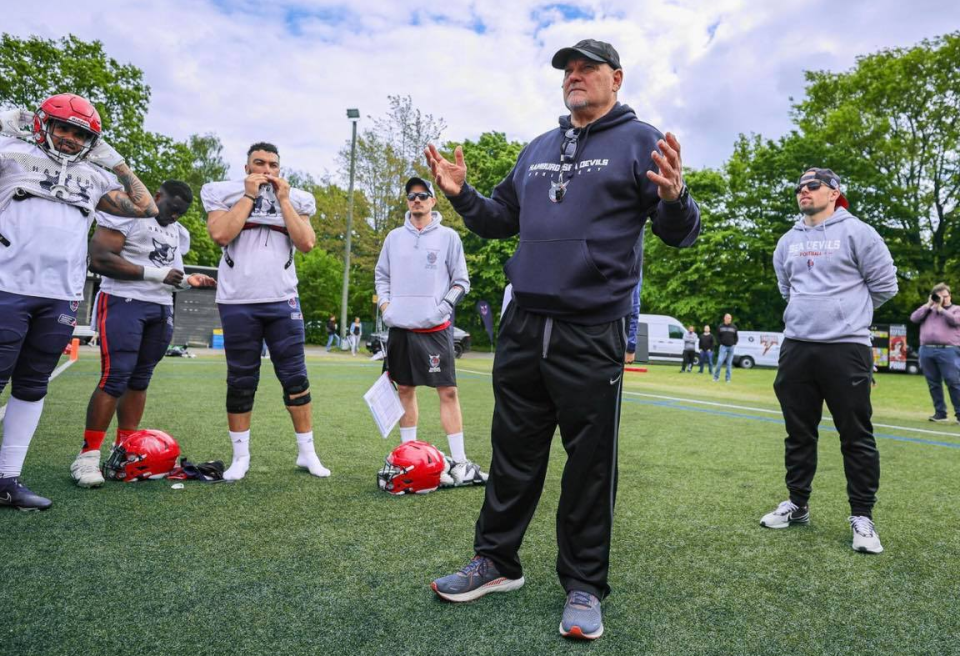
AFI: What steps do you think the league could take in the near future to grow the sport even more in Europe?
Heidelberg: Well, I think, like I said before, it comes down to player development and coaches. You just can’t have a head coach just because he comes from the NFL. You’ve got to have a support staff in, and I think it’s really important for general managers and head coaches to work together. And I saw that in Hamburg, the general manager and the head coach in Hamburg, they work great together. So, it’s what you, you want to have support, and you don’t want to be a lone ranger. And for me, that’s so critical. What I like, personally, is working with a staff. I want to work with a young coach, I want to be a mentor to coaches, also. I’ve been doing this a long time, and I’m looking forward to getting back in the ELF, in coaching and mentoring. What’s really important, what guys don’t understand, is when you have a staff and you can meet with them, you can game plan, and you can go over things, it’s going to make your program better and it makes your football team better. And your players see that, hey, there’s an invested interest in the players and how we develop and how we do everything about our program; how we practice, how we do walkthroughs, how we watch video, those are things that really excite me. I like structure. If you’ve ever been around Nick Saban, he’s a great college football coach, everything’s about structure and meetings, everything’s about getting better. The other thing is evaluating your players and holding them accountable, building a culture. That’s what excites me, and I’m hoping to get that opportunity again.
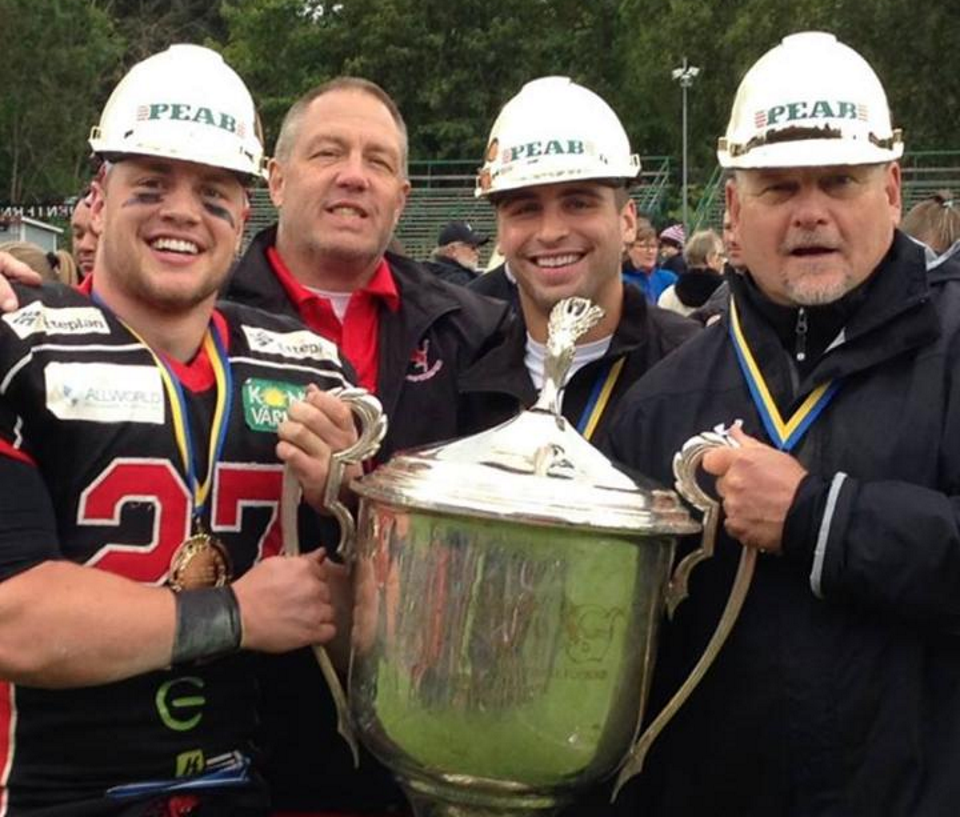
Kirk Heidelberg (far right) holding the Swedish championship cup after helping the Carlstad Crusaders win the 2015 title
AFI: Have you had mentors over the years that have helped you out? What lessons have they taught you that have stuck with you?
Heidelberg: Well, I was fortunate enough to work for some really good head coaches, as I mentioned, Nick Saban, Gary Pinkel, those two at University of Toledo. So, I really learned how to be organized, how to be structured, how to be disciplined. You take everything from that. And those guys learn from a guy you wouldn’t even know but his name was Don James, from the University of Washington. So, you know, it’s just like getting your doctorate in organization. So, I’ve always tried to carry that with me here. I don’t like coaching by myself. In Hamburg, I really liked the staff and I liked to have meetings, and I like to be organized. That’s the thing where I think the league can really grow, and it’ll get better because then it’s more professional, as far as the coaching. The coaching has got to catch up with the players too.
AFI: Being over there in Europe, and getting to know a lot of people who might have different languages or different cultures. So as the head coach and the leader of the team, how have you tried to build relationships with your players?
Heidelberg: That’s a great question, because you’ve really got to connect with your players. I always say this: a lot of people communicate, but very few connect. And I’ve changed my coaching style. I used to be a really tough, get-after-it coach, and I’m still intense. But I like to be intense, positively. I’m intensely positive. I think sometimes as coaches, we’re too negative. If you’re going around screaming and yelling, all the time, it’s very negative. A lot of coaches come and go here, because if they come from the States and they’re coaching college or coaching pro, these (European) guys are working, they’re not full time football players; most of the Germans. So, you know, that’s a great question. So you have to connect with them, you have to be able to explain things and you have to be patient, you really do. Because you want to get the best out of your players, and you’re not going to get the best out of them if you’re going around just talking down to them and berating them, like how it was when I was young. When I played, I was in a ‘yes sir, no sir’ generation. You didn’t ask questions. And now you want your players to ask questions, you want to be able to explain it so that they understand things.
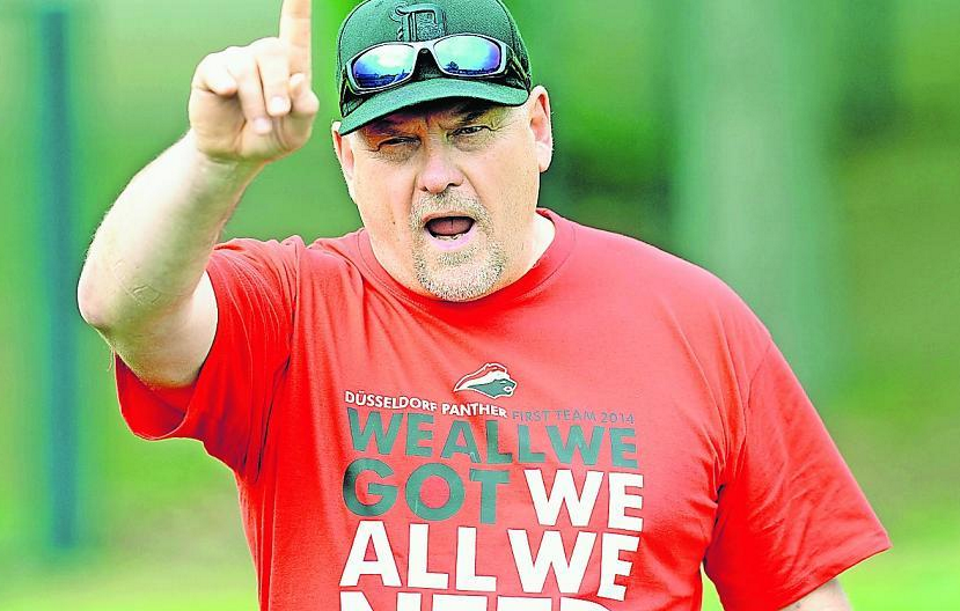
Photo: Horstmüller
AFI: Is it different coaching the mental aspect of the game in Europe, where football isn’t around 24/7, so you might have to explain the Xs and Os and strategies as a bigger point of emphasis?
Heidelberg: I think it’s really important. Like I was saying, it goes back to the offseason, teaching those fundamentals, teaching the techniques. Because we have a tendency to go, ‘hey, let’s throw this scheme at them’. This is great. This is the air raid, or this is the spread offense. And you forget sometimes that these guys need to learn how to walk before they can run. But their football intelligence is really coming up, their football IQ is rising. There’s some good coaches in this league too, that’s the other thing I want to say. There’s some darn good coaches. So every week, you’ve got to be ready. That’s what I like about the ELF. Every week, you’ve got to be ready, because anybody can beat you, you just never know. I mean, you look at Istanbul, they took Hamburg to overtime, and they beat Barcelona. What makes it fun to me is that you have to bring your best.
AFI: Finally, what do you like to do when you’re not on the football field?
Heidelberg: That’s a great question. I like to go to Mass, believe it or not. I’m Catholic. And there’s a lot of beautiful churches here. Incredibly, in my little village here, there’s one church built in 1138, and I go there. I try to attend Mass and I love to work out, I love to walk. I love my family, we have a dog now, so I don’t have a lot of hobbies. Oh, and riding my bike, I try to bike every single day. I try to work out 90 minutes every day. And that keeps me busy.